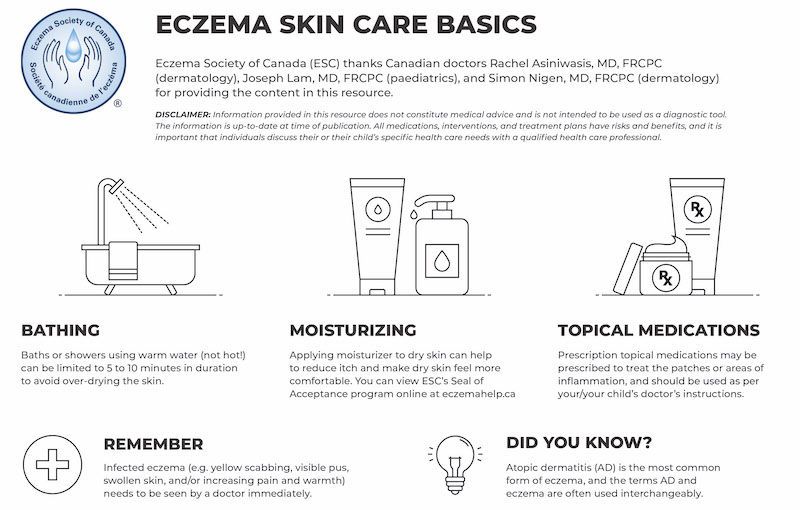Frequent moisturization of the skin can be necessary in patients with eczema.
The natural skin barrier, which would normally trap moisture in the skin, doesn’t work well for patients with eczema. This leaves the skin dry, rough, and sensitive to irritants. It is a common myth that drinking an adequate amount of water during the day will hydrate the skin—however, applying a moisturizer frequently does help hydrate the skin.
After bathing, gently pat the skin dry. Then follow your doctor’s recommendations for moisturizing and medication use (e.g., immediately applying your prescription treatments to the skin affected by eczema, and applying a moisturizer to areas of the skin that don’t have active eczema).
Daily baths or showers are reasonable for people with eczema, however, the duration of the bath or shower should be brief (5 to 10 minutes) and the bath or shower should be done with fresh, warm (not hot) water without additives such as soap or bubble bath.
It is important to understand that eczema is a chronic condition, for which there is no cure. Therefore, it is equally important to understand how to manage the condition.
The goal of eczema management is to reduce the inflammation during acute flares. During periods of clear skin, the goal is to maintain that skin through moisturizer use.
Some eczema triggers may be avoidable (e.g., harsh soaps) but some triggers may be unavoidable (e.g., sweating for an athlete). Sometimes an eczema flare can occur with what seems like no trigger.
You can discuss your eczema and suitable medications with your or your child’s physician.
Medical treatment is an important part of controlling eczema and medications (including topical creams and ointments) should be used as prescribed by your physician.
Topical corticosteroids are prescribed to reduce inflammation and itching. Strengths range from mild to very strong. Follow your physician’s recommendations exactly and address any questions or concerns you have with your physician.
Topical calcineurin inhibitors (e.g., Elidel®, Protopic®) are prescribed for inflammation and itching and can be used for short, intermittent periods of time unless otherwise directed by your physician. A possible side effect is a mild to moderate burning sensation.
Topical PDE4 inhibitors (e.g., Eucrisa™) work to block an enzyme called phosphodiesterase 4 (called PDE4 for short) from allowing too much inflammation to occur in the skin. Cells in our immune system produce PDE4 which promotes the production of cytokines (proteins that contribute to inflammation). A possible side effect is a mild to moderate burning sensation.
Topical antibiotics are prescribed for secondary infection which can worsen the eczema and may make it more difficult for the eczema to respond to treatment until the bacterial infection has been cleared. Topical antibiotic creams and ointments may treat localized areas of infected or resistant eczema.
Oral antibiotics are prescribed for more significant skin infections. There is often secondary infection on skin affected by eczema, even when there may be no other obvious signs of infection. Oral antibiotics are preferred over topical antibiotics when the infection is extensive.
Antihistamines use in eczema management is not recommended and should be discussed with your healthcare provider. Use of antihistamines for children 6 years of age and under is not recommended.
While many can often manage their eczema through a moisturizing regimen and topical medications, some individuals with a severe form of the disease don’t have an adequate response and may benefit from more aggressive therapies. If you are struggling to manage your eczema, talk to your healthcare provider about your options.
Cyclosporine, methotrexate, azathioprine, and mycophenolate mofetil are systemic therapies commonly used off-label for severe eczema by dermatologists. It is important to note that all of these medications can cause side effects and require regular monitoring. They should be used with caution and after discussion of their risks and benefits with your physician.
Phototherapy, specifically broad and narrow-band UVB light, can be helpful for its local immunomodulatory effect. There are specific phototherapy units that are used to treat the hands and the body. Speak to your doctor about the possibility of phototherapy as a treatment option.
Oral corticosteroids (e.g., prednisone) are rarely used and reserved for the most severe cases. There are long-term side effects with prolonged use, and because eczema is a chronic condition, this is not a permanent solution for severe chronic eczema.
Biologic drugs for atopic dermatitis (AD), e.g., dupilumab (brand name Dupixent®), lebrikizumab (brand name Ebglyss™) and tralokinumab (brand name Adtralza®), are for patients with AD (the most common form of eczema) that is moderate or severe and does not improve enough with topical medications. Biologics for AD are taken with a needle injection under the skin. The medication works to stop the process of inflammation that occurs with AD. Speak with your doctor to learn more about biologics for AD.
Oral JAK inhibitors, e.g., upadacitinib (brand name Rinvoq®) and abrocitinib (brand name Cibinqo®), are a new class of medication indicated for the treatment of adults and adolescents 12 years of age and older with moderate to severe atopic dermatitis (AD) who are not adequately controlled with a systemic treatment or when use of those therapies is inadvisable. Oral JAK inhibitors work to treat AD by acting on multiple inflammatory pathways at the same time. It is these overactive inflammatory pathways that cause the inflammation of AD. Speak with your doctor to learn more about oral JAK inhibitors for AD.
Learn about bathing, moisturizing, and eczema management, as well as common triggers and techniques to cope with itch.
